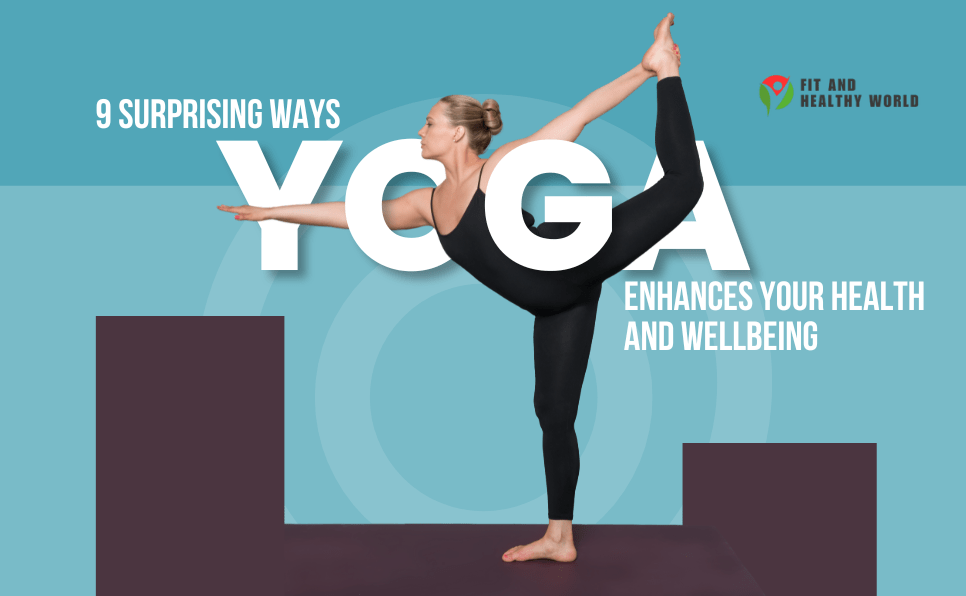Yoga is now essential for millions. They seek to improve their flexibility, balance, and health. It extends far beyond merely engaging in physical exercise. It’s a holistic mind-body activity that improves your general health. This site is the best for anyone wanting a better lifestyle. It examines the many health benefits of yoga. Yoga has amazing, life-changing effects. It lowers stress and anxiety. It also boosts flexibility and heart health. Fit and Healthy World is a great place to find more wellness resources.
Improving Posture and Flexibility for a Balanced Body
It’s well known that yoga increases flexibility. With regular practice, your muscles and joints can increase their flexibility. It slowly expands your range of motion and makes daily duties easier. Poses like downward dog, child’s pose, and cobra release tension. They stretch your muscles and improve your posture.
Yoga also does wonders for the health of your spine. Your spine suffers when you stand or sit for extended periods of time. The spinal motions used in yoga help with posture and back pain relief. Better posture makes the body more balanced and powerful.
Principal advantages of increased adaptability
- Less rigidity in the muscles.
- Improved alignment
- Expanded range of motion
Strengthening Joints and Muscles: Yoga’s Special Method
Yoga relaxes and gently builds muscle strength. As you practice positions like warrior and plank, your body becomes more self-supporting. This strengthens your muscles without overstressing your joints.
Yoga targets different muscle groups and is a full-body workout. People find it perfect for preserving or even increasing muscle tone because of this. Yoga balances. It strengthens and protects your joints, especially your wrists and knees.
Yoga positions that improve muscle strength
- Plank position
- Posing like a warrior.
- Chair Position
The Fundamentals of Yoga
Heart health can experience considerable improvement after practicing yoga. Regular yoga practice lowers cholesterol and blood pressure, according to studies. Yoga and pranayama (or breathing activities) are beneficial for strengthening the heart.
Yoga improves circulation. It strengthens the heart and lowers heart disease risk. Yoga breathing exercises are beneficial to heart health. They calm the body and reduce the heart rate.
The advantages of yoga for heart health
- Lowered blood pressure
- Reduced cholesterol levels
- Increased blood flow
Natural Solutions for Stress and Anxiety
Yoga’s main benefit is stress reduction. Calming the mind is yoga’s main goal for mental health. Yoga promotes mental clarity and awareness of the present moment. It uses intentional breathing and meditation to achieve this.
Anxiety symptoms are often relieved by yoga for depression. Cortisol, the stress hormone, is much easier to lower through regular practice. As a result, you feel less anxious and more conscious of who you are.
Yoga reduces stress by
- The body initiates the parasympathetic nervous system.
- Lowers cortisol levels
- Promotes mindfulness and serenity
check out Fit and Healthy World for additional guidance on exercises that build strength and protect your joints.
Increasing Sleep Quality: Relaxing Your Body and Mind
It’s important to have good sleeping habits, and yoga can improve your sleep cycles. Try some forward bends and legs-up-the-wall yoga poses before going to bed. They will assist your body in releasing tension. This prepares you for a deeper, more tranquil slumber.
The breathing and mindfulness practices of yoga aid in mental relaxation. This allows you to sleep longer and better. Better sleep contributes to better physical and mental well-being.
Yoga poses can improve your quality of sleep
- Restorative yoga
- The location of the child.
- Bends forward
Enhancing mental well-being through focus and awareness
Yoga has enormous benefits for mental health. Its focus on mindfulness improves mental well-being and reduces negative thought patterns. Regular yoga can improve your focus and cut distractions.
Many find that yoga helps control their depression and anxiety. It improves mood and increases self-awareness. Yoga enhances your intellectual clarity. It enhances your ability to manage emotions.
Yoga’s impact on mental health
- Reduced symptoms of depression
- Improved emotional restraint
- Enhanced mental clarity and concentration
Yoga Breathing Exercises to Strengthen Your Respiratory System
The breathing techniques known as pranayama are an essential component of yoga. It aids in the development of respiratory control. This is essential to the health of your lungs. Pranayama expands lung capacity, which makes deep breathing easier.
People with asthma and other lung conditions often find relief from yoga. Breathing exercises can improve lung function and reduce discomfort. Furthermore, deliberate breathing reduces stress in the mind.
Yoga breathing’s benefits
- Enhanced lung capacity
- Increased oxygen flow within the body
- Reduced symptoms of asthma
Improving gastrointestinal health and treating intestinal issues
Yoga poses that involve twists and gentle abdominal stretches help to stimulate digestion. These movements massage the internal organs. They ease bloating and aid digestion.
Yoga enhances the health of the intestines by reducing stress. Stress on the body might cause digestion to slow down. Yoga for well-being can help your digestive system function at its peak.
Doing yoga can help your digestive system
- Twists while seated.
- Cobra stance
- Bridge location
Which is healthier: yoga or the gym?
Many wonder which is better for health—yoga or the gym. Yoga offers a comprehensive method. Yoga improves strength, balance, flexibility, and mindfulness. It is impossible to get rid of the adverb. For many, it’s a better option. It boosts physical and emotional wellness.
Yoga gives arthritis sufferers a low-impact workout. It’s an excellent choice for individuals of all ages because it allows for a relaxed pace. Yoga differs from traditional exercise because of its benefits for mental wellness. Better mindfulness and reduced stress are two of these. Take a look at the resources on Fit and Healthy World.
In summary
Yoga is a life-changing exercise with many health advantages. Beyond the mat, yoga has many health benefits. It increases flexibility and strength, reduces tension, and enhances sleep. Yoga may help you achieve your goals. It can improve your physical and mental well-being. That is a useful tactic.
Common Questions About the Health Benefits of Yoga
Which kind of yoga is best for your health?
One of the healthiest styles of yoga is hatha. It is because of its emphasis on breathing and well-balanced poses. It is enjoyable for both newcomers and seasoned practitioners.
Does yoga improve one’s health?
Yoga does, in fact, provide large improvements to both physical and mental health. It promotes deeper sleep, lowers stress, boosts flexibility, and enhances cardiovascular health.
What benefits can yoga provide?
Yoga improves strength, flexibility, heart health, mental clarity, and sleep. This is a holistic approach to well-being.
Which works better, the gym or yoga?
Yoga is a great practice if you want to combine strength, flexibility, and serenity. It fits better. The gym is better for intense strength and aerobic training.
How can I develop flexibility in my physical activity, yoga practice, and diet?
Incorporate yoga poses such as forward bends while seated and downward dog. They emphasize stretching and suppleness. A diet rich in fruits, vegetables, lean meats, and balance can be beneficial. It might keep muscles flexible.
Which websites are the most useful for yoga poses for beginners?
Check out DoYogaWithMe, Gaia, and Yoga Journal for an excellent introduction to yoga.
What style of yoga is best for our health?
Both Hatha and Vinyasa yoga are good for preserving health. They offer an excellent mix of strength, movement, and awareness.



